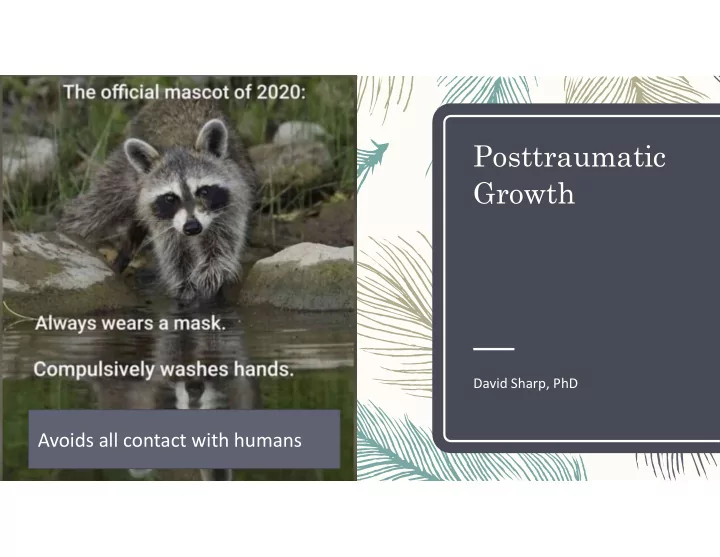

Posttraumatic Growth David Sharp, PhD Avoids all contact with humans
Definition of Trauma – Exposure to actual or threatened harm Directly – – Witnessed – Learned about the trauma of a family member or close friend – Repeated exposure or extreme exposure to aversive details of events
Trauma Can Lead to Cognitive Reassessments – How empathetic and caring people in general are – How safe and predictable my life is – How safe and predictable my world is – How vulnerable I actually am – How much autonomy I actually have
Posttraumatic Growth (PTG) Defined as a process, an outcome, or both. It is the way in which a person, persons, or community can benefit from the struggle with their new reality after traumatic events – Incorporates identity with cultural and environmental influences – By engaging with our struggle, we have the opportunity change or develop the “meaning” of our life – Wisdom – Resilience – Gratitude
Not a New Concept “But we also boast in our sufferings, knowing that suffering produces character” Romans 5:5 “Even his griefs are a joy, long after, to one that remembers all that he wrought and endured” Homer, The Odyssey “What doesn’t kill you makes you stronger” Kelly Clarkson, Stronger First described as “Stren Conversion” in 1974 1 1 Finkel, NJ (1974) Strens and trauma: An attempt at categorization. American Journal of Community Psychology. 2. 265-273
Watershed Events An event marking a unique or important change of course or one in which important developments depend Can be Cultural/Global – Small pox vaccine – Printing press – Black Plague Can be personal – Divorce Car accident – – Heart attack
Black Plague in England Plague years Shakespeare Works – 1592 – Richard III (~1592) – 1603 – Othello (~1604) – 1606 – King Lear (~1606) – 1609 – Macbeth (~1606) – Cymbeline (~1610) Between 1603 and 1613, theatres in London were closed for a grand total of 78 months
The Process of PTG – Trauma creates PTSD, interacting with the stress and trauma encourages PTG PTSD and PSG coexist – – Survive first, grow second – Not all routes are linear and not all paths are the same
Changing the Framing As health professionals – Can we see people as strong rather than broken while acknowledging that both words require a struggle? – Can we accept that trauma may not come from COVID but rather all of the other elements of a persons life? – Can we find ways to facilitate growth and turn strength into service for our community?
Commonly Associated Changes from PTG 1,2 The five domains – Increased belief in personal strength – Changes in perspective about relationships with others – More informed opinions in the characteristics of others – Modified priorities, goals, values – Spiritual Growth 1 Calhoun & Tedeschi, 2004 2 Tedeschi & Calhoun, 2004
Looking Forward We are masters of denial and distraction
Looking Forward We are masters of denial and distraction Trauma forces us to confront the human condition Socially shared schemas can be challenged and changed by traumas that have impacted the majority of a population. Image used with permission from Pete Railand, https://amplifier.org/
Current Positive Growth – Car accidents have gone down (62% in Washington State) – Child respiratory illness has gone down – Hand washing has become popular – Air pollution around major cities has decreased 20-30% Two months of improved air quality in china may save 4k children and 50k elderly 1 – – One Fortune 500 company has seen a strong boost in productivity 2 1 Burke M. Covid-19 reduces economic activity, which reduces pollution, which saves lives. G-FEED.org. 24 May 2020. www.g-feed.com/2020/03/covid- 19-reduces-economic-activity.html 2 Dr. Sharp phone conversation with one of the executives May 26 th 2020 Screenshot of article on left taken from newrepublic.com
Post Traumatic Growth We are the change agents because our trauma is global – What do we normalize? – What do we leave behind in our pre traumatic past? – What do you want next month to look like? – What do we want next year to look like?
Thank you
Recommend
More recommend